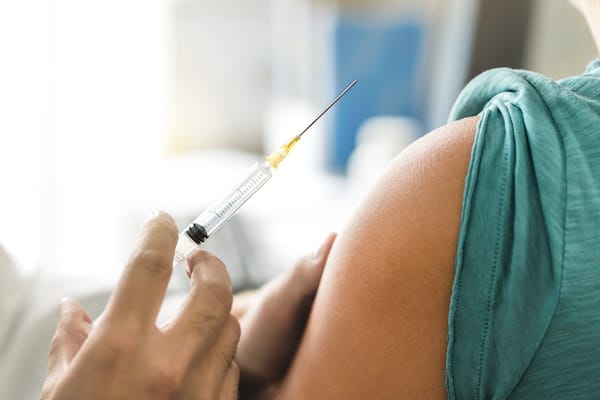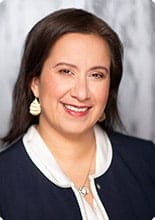By Helen Arteaga Landaverde, MPH, Chief Executive Officer, NYC Health + Hospitals/ Elmhurst
Coming on as the CEO for NYC Health + Hospitals nine months ago was both a challenge and a homecoming for me. The hospital resides in the single most diverse zip code in the nation. We have 123 different languages spoken here and 92 different cultures represented. It was a challenge I relished because this is my community where my family is from and where I live. These two drivers mean that I’ve spent a great deal of time thinking about equity.
COVID-19 changed how we think about our work. In the past, the patient-provider relationship was generally a one-sided conversation. In our community, most patients did not question healthcare providers’ guidance. Not anymore. With increasing COVID-19 vaccine rumors and misinformation, we’re getting questions about both COVID-19 and flu vaccine. In my 25 years in healthcare, I’ve never had anyone ask me what is in the flu shot. Until now.
This is a challenge and an opportunity. How we meet the moment will shape healthcare equity in the years to come.
At NYC Health + Hospitals, it’s part of our mission and vision. We work to deliver comprehensive health services of the highest quality in an atmosphere of humane care, dignity, and respect. We promote and protect, as both innovator and advocate, the health, welfare, and safety of our community. This means that equity is front and center in everything we do.
I’m proud that our community is asking questions and taking a more active role in their health. But this shift means that we have a higher level of responsibility to ensure we are meeting our patients where they are and addressing the need for information they haven’t looked for in the past. This means ensuring health education is accessible so patients can make true informed decisions about their health. We’ve done this by creating messages that are understandable, translating technical material into simple “bites of information.” In the last year, we’ve used over 3 million translation minutes to ensure all members of our community have access to the information they need to make healthy choices. We’ve also gotten creative about how we are reaching our community. While our community is diverse, there is one commonality – coffee. We’ve partnered with our local coffee vendors and bodega owners, training them on COVID-19 and flu vaccine information, and provided them with coffee cups that have clear calls to action to vaccinate. Using the community to advocate for its members is both effective and ethical. People need to see us working with the community and developing trusted partnerships. Something as small as a coffee cup can make a big difference. We’ve given out 20,000 coffee cups so far and it’s been our biggest educational outreach success.
The final piece of the puzzle this shift has brought to us is reframing our patient-provider interactions. We’re retraining our staff to be ready for a more bidirectional conversation than they have been used to in the past. We need to build an environment that empowers our patients, encourages their questions, and provides information that is appropriate and understandable.
One of the tools I find particularly useful is the Center for Sustainable Health Quality and Equity’s DRIVE program. DRIVE is a simple resource I’ve successfully used to help increase flu and COVID-19 vaccinations in my former role at Plaza Del Sol Family Health Center, a federally qualified health center (FQHC) serving a largely Hispanic neighborhood in Queens, New York. DRIVE was so successful at Plaza Del Sol that, in advocating for flu shots at the epicenter of the COVID-19 pandemic, we administered our entire supply of flu vaccinations and at one point, even ran out of supply – a first for this Queens community. Most health systems and hospitals are overtaxed in normal times, and even more so during COVID-19, so adding the flu season on top of everything may feel overwhelming. But the DRIVE toolkit takes a complex process and make its easy. The templates are already vetted. They meet the equity and diversity best practices so I know the DRIVE tools will help me reach the communities most at risk this flu season. What I like best about DRIVE is that it is not simply something appealing to administrators. Because of it ease in incorporating into existing efforts, it’s something easy for providers to also accept. It’s a hard sell to ask overtaxed providers to take on more things. But DRIVE is simple to implement and actually makes providers’ jobs around flu vaccination uptake easier and more successful. It also has a robust training component that addresses many of the needs in the new “participatory” healthcare conversations that are becoming the norm between patients and providers.
As healthcare system administrators, my peers and I always try to do what’s best for our community. But we need to be both administrators and advocates. Part of that advocacy means ensuring we allocate some time and resources to flu vaccination. This preventative, upstream approach can help both our health systems from being overburdened and provide very real and direct protection for families in our community.
Helen Arteaga is Chief Executive Officer at New York City Health + Hospitals/Elmhurst. She is the former Assistant Vice President, Queens Network and Executive Initiatives at Urban Health Plan, a network of community health centers located in three boroughs in New York City.
*Helen is Ecuadorian and a long-time resident of Corona, Queens. Helen grew up understanding the role that health care had on a community. She dreamed of establishing a community health center that would provide quality health care to local residents. Following the death of her community activist father, she set out to build that health center in her beloved Corona.
Working with Our Lady of Sorrows Church and other community leaders, she sought out Paloma Hernandez, the President and CEO of Urban Health Plan, Inc., to make her dream a reality. Together, they opened Plaza del Sol Family Health Center in June, 2009. Last year, Plaza Del Sol provided care to more than 29,000 patients regardless of their ability to pay. The health center was dedicated in her father’s memory in 2014.
The Editorial Team at Healthcare Business Today is made up of skilled healthcare writers and experts, led by our managing editor, Daniel Casciato, who has over 25 years of experience in healthcare writing. Since 1998, we have produced compelling and informative content for numerous publications, establishing ourselves as a trusted resource for health and wellness information. We offer readers access to fresh health, medicine, science, and technology developments and the latest in patient news, emphasizing how these developments affect our lives.









